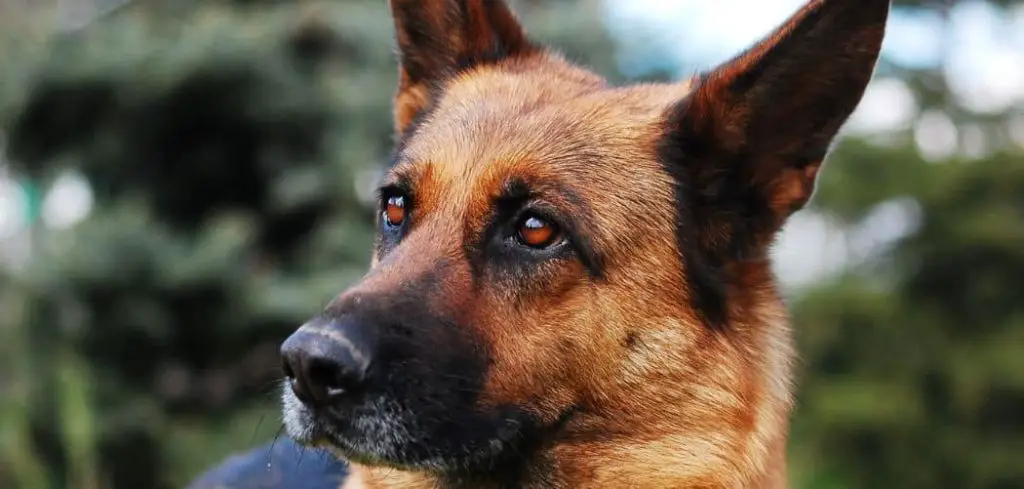It can be worrying to notice both mucus in a dog’s poop and a habit of eating grass.
While either symptom alone is somewhat common, the combination can point to irritation in the digestive system or even an underlying medical condition that needs attention.
We outline the common causes of mucus in a dog’s poop and grass eating, what you can do at home, and when to seek veterinary help.
Table of Contents
Mucus in Dog Poop and Eating Grass — Why It Happens
Mucus in a dog’s stool often indicates inflammation in the intestines, and eating grass can be a dog’s way of soothing digestive discomfort. Causes may include dietary issues such as food intolerance, intestinal parasites, colitis, infections, or even more serious problems like pancreatitis or inflammatory bowel disease.
Stress or sudden changes in diet can also contribute to both grass eating and mucus in the stool.
Because the causes range from mild to severe, paying close attention to other symptoms is important.

Mucus in Dog Poop and Eating Grass: Common Causes
Dietary Indiscretion
Dogs that eat something unusual—like spoiled food, fatty scraps, or foreign objects—may develop irritation in their digestive tract.
This irritation leads to mucus production in the stool as the body tries to protect the intestines.
At the same time, a dog may instinctively eat grass to trigger vomiting or calm the stomach. Owners often notice soft or loose stools, sometimes with visible mucus or even small streaks of blood.
While many cases resolve with rest and a bland diet, repeated episodes should not be ignored.
Read more: Mucus in Dog Poop and Not Eating (Here’s Why)
Food Sensitivities or Allergies
Some dogs have sensitivities to ingredients like chicken, beef, wheat, or soy. These sensitivities cause inflammation in the gastrointestinal lining, which can result in mucus-filled stools. Grass eating may appear as a coping behavior to ease nausea or discomfort.
Dogs with food allergies might also show itching, ear infections, or skin problems alongside the digestive issues.
Over time, untreated food sensitivities can worsen, so dietary trials or prescription diets are often recommended by veterinarians.
Intestinal Parasites
Worms such as whipworms or roundworms, as well as protozoa like giardia, can lead to mucus in the stool.
These parasites irritate the intestinal walls, causing inflammation. Infected dogs often experience diarrhea, weight loss, and lethargy along with the mucus.
Dogs may also eat grass in response to nausea or abdominal discomfort caused by the parasites.
Since parasites are contagious and can spread to other pets, prompt diagnosis and deworming treatments are crucial.
Colitis
Colitis refers to inflammation of the colon and is a very common cause of mucus in dog poop. Stress, infections, or dietary changes are frequent triggers.
Colitis often leads to frequent, urgent bowel movements that are soft, coated in mucus, and sometimes bloody.
Dogs with colitis may also eat grass when their stomach feels upset. The behavior is often seen before or after loose bowel movements.
While stress-related colitis can sometimes resolve, chronic cases need veterinary evaluation and treatment.
Inflammatory Bowel Disease (IBD)
IBD is a chronic condition where the immune system attacks the lining of the digestive tract, leading to long-term inflammation.
This results in mucus in the stool, intermittent diarrhea, weight loss, and poor appetite.
Grass eating in dogs with IBD may be an instinctive attempt to soothe gut irritation or induce vomiting.
Because IBD can be painful and requires long-term management with diet changes and sometimes medication, veterinary care is essential for these dogs.
Pancreatitis
Pancreatitis occurs when the pancreas becomes inflamed, usually after a dog eats fatty food or due to an underlying metabolic issue.
This inflammation can disrupt digestion, leading to mucus in the stool, diarrhea, and vomiting.
Dogs with pancreatitis may eat grass in response to nausea or abdominal pain. Pancreatitis is serious and can become life-threatening, especially if accompanied by fever, lethargy, and persistent vomiting. Any suspicion of this condition requires urgent veterinary attention.
Mucus in Dog Poop and Eating Grass: What to Do
If your dog passes a single stool with mucus but otherwise seems well, you may monitor at home. Offering a bland diet such as boiled chicken and rice for 24–48 hours can help soothe the stomach. Always provide fresh water, as diarrhea and mucus can lead to dehydration.
If food intolerance is suspected, keeping a food diary and gradually transitioning to a high-quality, limited ingredient diet may help reduce flare-ups.
Regular deworming and fecal testing are also important steps in preventing parasites from causing digestive upset.
Stress management plays a role as well. Keeping a routine, avoiding sudden food changes, and providing enrichment can reduce digestive problems linked to anxiety.
If grass eating becomes excessive, redirecting your dog with safe chew toys or mental games can help break the habit.
When to Call or Visit Your Vet
Veterinary attention is needed if mucus in your dog’s stool persists beyond two days, or if it occurs with other concerning symptoms. Red flags include:
Blood in the stool
Vomiting, especially if frequent
Refusal to eat or drink
Signs of pain such as whining or hunched posture
Weight loss or ongoing lethargy
Because conditions like pancreatitis, parasites, and IBD can become severe if untreated, it’s always better to seek professional guidance when in doubt. A veterinarian may perform fecal testing, blood work, or imaging to identify the cause.
Read more: Mucus in Dog Poop After Eating Bone (When to worry)
Key Takeaway
Mucus in dog poop and eating grass often occur together when the digestive system is irritated. While minor dietary issues may be to blame, serious conditions such as parasites, colitis, IBD, or pancreatitis are also possible.
Owners can try supportive care at home for mild, short-term cases, but ongoing symptoms always require veterinary evaluation. With timely attention, many dogs recover well and return to their usual healthy selves.
